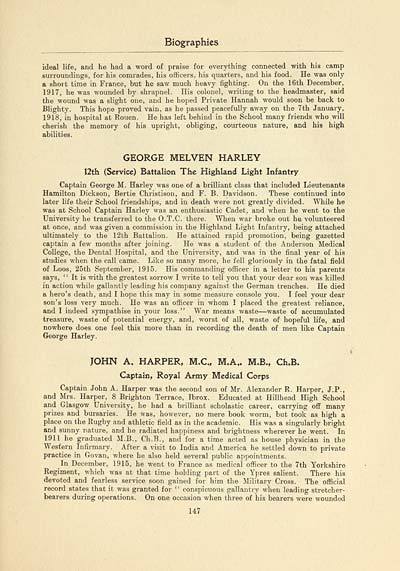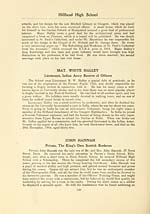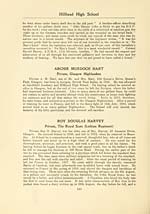Organisations > Hillhead High School war memorial volume
(151) Page 147
Download files
Complete book:
Individual page:
Thumbnail gallery: Grid view | List view

Biographies
ideal life, and he had a word of praise for everything connected with his camp
surroundings, for his comrades, his officers, his quarters, and his food. He was only
a short time in France, but he saw much heavy fighting. On the 16th December,
1917, he was wounded by shrapnel. His colonel, writing to the headmaster, said
the wound was a slight one, and he hoped Private Hannah would soon be back to
Blighty. This hope proved vain, as he passed peacefully away on the 7th January,
1918, in hospital at Rouen. He has left behind in the School many friends who will
cherish the memory of his upright, obliging, courteous nature, and his high
abilities.
GEORGE MELVEN HARLEY
12th (Service) Battalion The Highland Light Infantry-
Captain George M. Harley was one of a brilliant class that included Lieutenants
Hamilton Dickson, Bertie Christison, and F. B. Davidson. These continued into
later life their School friendships, and in death were not greatly divided. While he
was at School Captain Harley was an enthusiastic Cadet, and when he went to the
University he transferred to the O.T.C. there. When war broke out he volunteered
at once, and was given a commission in the Highland Light Infantry, being attached
ultimately to the 12th Battalion. He attained rapid promotion, being gazetted
captain a few months after joining. He was a student of the Anderson Medical
College, the Dental Hospital, and the University, and was in the final year of his
studies when the call came. Like so many more, he fell gloriously in the fatal field
of Loos, 25th September, 1915. His commanding officer in a letter to his parents
says, " It is with the greatest sorrow I write to tell you that your dear son was killed
in action while gallantly leading his company against the German trenches. He died
a hero's death, and I hope this may in some measure console you. I feel your dear
son's loss very much. He was an officer in whom I placed the greatest reliance,
and I indeed sympathise in your loss." War means waste — waste of accumulated
treasure, waste of potential energy, and, worst of all, waste of hopeful life, and
nowhere does one feel this more than in recording the death of men like Captain
George Harley.
JOHN A. HARPER, M.C, M.A.. M.B., Ch.B.
Captain, Royal Army Medical Corps
Captain John A. Harper was the second son of Mr. Alexander R. Harper, J. P.,
and Mrs. Harper, 8 Brighton Terrace, Ibrox. Educated at Hillhead High School
and Glasgow University, he had a brilliant scholastic career, carrying off many
prizes and bursaries. He was, however, no mere book worm, but took as high a
place on the Rugby and athletic field as in the academic. His was a singularly bright
and sunny nature, and he radiated happiness and brightness wherever he went. In
1911 he graduated M.B., Ch.B., and for a time acted as house physician in the
Western Infirmary. After a visit to India and America he settled down to private
practice in Govan, where he also held several public appointments.
In December, 1915, he went to France as medical officer to the 7th Yorkshire
Regiment, which was at that time holding part of the Ypres salient. There his
devoted and fearless service soon gained for him the Military Cross. The official
record states that it was granted for ' ' conspicuous gallantry when leading stretcher-
bearers during operations. On one occasion when three of his bearers were wounded
147
ideal life, and he had a word of praise for everything connected with his camp
surroundings, for his comrades, his officers, his quarters, and his food. He was only
a short time in France, but he saw much heavy fighting. On the 16th December,
1917, he was wounded by shrapnel. His colonel, writing to the headmaster, said
the wound was a slight one, and he hoped Private Hannah would soon be back to
Blighty. This hope proved vain, as he passed peacefully away on the 7th January,
1918, in hospital at Rouen. He has left behind in the School many friends who will
cherish the memory of his upright, obliging, courteous nature, and his high
abilities.
GEORGE MELVEN HARLEY
12th (Service) Battalion The Highland Light Infantry-
Captain George M. Harley was one of a brilliant class that included Lieutenants
Hamilton Dickson, Bertie Christison, and F. B. Davidson. These continued into
later life their School friendships, and in death were not greatly divided. While he
was at School Captain Harley was an enthusiastic Cadet, and when he went to the
University he transferred to the O.T.C. there. When war broke out he volunteered
at once, and was given a commission in the Highland Light Infantry, being attached
ultimately to the 12th Battalion. He attained rapid promotion, being gazetted
captain a few months after joining. He was a student of the Anderson Medical
College, the Dental Hospital, and the University, and was in the final year of his
studies when the call came. Like so many more, he fell gloriously in the fatal field
of Loos, 25th September, 1915. His commanding officer in a letter to his parents
says, " It is with the greatest sorrow I write to tell you that your dear son was killed
in action while gallantly leading his company against the German trenches. He died
a hero's death, and I hope this may in some measure console you. I feel your dear
son's loss very much. He was an officer in whom I placed the greatest reliance,
and I indeed sympathise in your loss." War means waste — waste of accumulated
treasure, waste of potential energy, and, worst of all, waste of hopeful life, and
nowhere does one feel this more than in recording the death of men like Captain
George Harley.
JOHN A. HARPER, M.C, M.A.. M.B., Ch.B.
Captain, Royal Army Medical Corps
Captain John A. Harper was the second son of Mr. Alexander R. Harper, J. P.,
and Mrs. Harper, 8 Brighton Terrace, Ibrox. Educated at Hillhead High School
and Glasgow University, he had a brilliant scholastic career, carrying off many
prizes and bursaries. He was, however, no mere book worm, but took as high a
place on the Rugby and athletic field as in the academic. His was a singularly bright
and sunny nature, and he radiated happiness and brightness wherever he went. In
1911 he graduated M.B., Ch.B., and for a time acted as house physician in the
Western Infirmary. After a visit to India and America he settled down to private
practice in Govan, where he also held several public appointments.
In December, 1915, he went to France as medical officer to the 7th Yorkshire
Regiment, which was at that time holding part of the Ypres salient. There his
devoted and fearless service soon gained for him the Military Cross. The official
record states that it was granted for ' ' conspicuous gallantry when leading stretcher-
bearers during operations. On one occasion when three of his bearers were wounded
147
Set display mode to: Large image | Transcription
Images and transcriptions on this page, including medium image downloads, may be used under the Creative Commons Attribution 4.0 International Licence unless otherwise stated. ![]()
| Rolls of honour > Organisations > Hillhead High School war memorial volume > (151) Page 147 |
|---|
| Permanent URL | https://digital.nls.uk/100541695 |
|---|---|
| Description | Listed alphabetically. |
|---|

